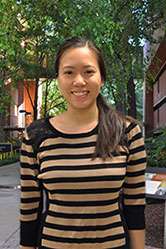Major: Biological Sciences
“The Genetic Basis of Host Defense Traits in the Drosophila Host-Parasitoid System”

Many studies have been dedicated to understand the relationship between molecular genetic variation and phenotypic variation (variation at the DNA sequence level and variation in the observable traits of an organism’s phenotypes). By understanding the relationship between these two factors, scientists can better understand how genetic variation contributes to phenotypic variation as well as how natural selection influences the evolution of species and gives rise to the diverse features of organisms. Studies have identified functions of many genes in Drosophila, however, have not obtained a complete understanding of which specific gene affects the phenotypic traits as well as influences the fitness of Drosophila in natural populations. The specific purpose of my research is to use the host-parasitoid relationship between Drosophila melanogaster and their parasitic wasp, Leptopilina boulardi-parasitoid wasp, to identify specific genes contributing to the host defense traits of Drosophila. RNA interference techniques, such as the GAL4/UAS system in Drosophila, will be used to knock down the expression of target genes and measure their effects on larval behavior and immune defense responses. Target genes, identified as candidate genes influencing larval host defense, were chosen from a previous genome wide association study in the Leip’s Lab. The first candidate gene is called “Sh”, a protein coding gene that affects Drosophila larval neurophysiological and behavioral functions. By knocking down the expression of this gene in targeted tissue, I can observe how this specific gene affects Drosophila larval behavior and how this, in turn, affects the non-immunological defense of the fly larvae against Leptopilina boulardi. Since the fitness of larval Drosophila is highly dependent on parastoid wasps, understanding the genetic basis of Drosophila larval host defense traits will help identify genes critical to Drosophila fitness. Because parasitoid wasps also evolve traits to overcome the host defense, these genes identified will also be a first step toward understanding genes involved in the co-evolution of host and parasitoid.
How did you find your mentor for your research?
I was introduced to my mentor through my brother, who previously worked with Dr. Leips. Dr. Leips was also my Professor my first year at UMBC and introduced my second mentor, Chia-Hua Lue.
How did you know this was the project you wanted to do?
I didn’t know this was the project I wanted to do. It took me about 2 years, working under the supervision of my two mentors, to determine what I ultimately wanted to pursue. With the correct guidance and learning opportunities I received in my lab, I was able to become inspired and decide what I wanted to do.
How much time do you put into your project?
I put roughly around 8-18 hours a week into my project. Since I get credit for my internship, I am required to work in my lab for at least 8 hours. However, there is not an exact time I put into my project. I usually work as many hours as I need to remain informed and on track.
How did you hear about the Undergraduate Research Award (URA) program?
I learned about the URA program from my mentors and peers in my lab (some were already or previously involved in the URA program).
Was the application difficult to do?
Yes, it required plenty of input and guidance from my mentors and peers. Since this was my first time doing an individual project, I took a lot of time reading research papers to determine how I wanted to address my project in the application. I also had to get my application revised multiple times by my mentor to ensure my explanations and responses were on par.
What has been the hardest part about your research?
The hardest part about my research was picking a hypothesis and knowing where to begin. It took quite a bit of brainstorming, reading, and discussing to decide what I wanted to do and how I was going to conduct my study in a reasonable manner.
What is your advice to other students about getting involved in research?
My advice to other students getting involved with research would be to ask a great deal of questions and be prepared to make a lot of mistakes. Take time to do your own research to fully understand your study.
8/22/2014